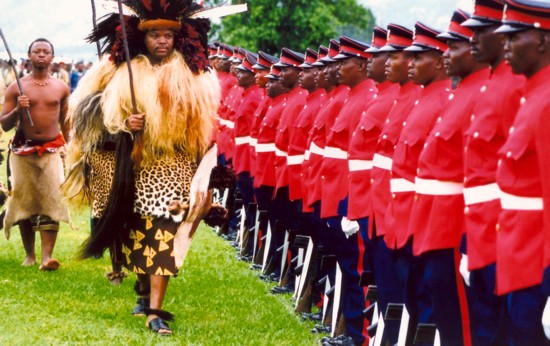FILM-FORWARD.COMReviews of Recent Independent, Foreign, & Documentary Films in Theaters and DVD/Home Video
Directed by Michael Skolnik Produced by Paola Mendoza & Skolnik Director of Photography, James Adolphus Edited by Martha Skolnik Music by Mark Killian English & Siswati with English subtitles USA. 84 min. Not Rated Narrated by Jeff Bridges Swaziland, a landlocked country approximately the size of New Jersey, has the lowest life expectancy in the entire world, 31, and the highest HIV prevalence rate – 42.6%. Without the King is an inside look at that country’s King Mswati III, Africa’s last absolute monarch; his 18-year-old daughter, Princess Sikhanyiso (“Pashu”), who is beginning her college education in California; and freedom fighters, who hope to remove the king from power and establish a constitutional democracy. It’s a strange, flawed, and fascinating film, very much worth seeing for anyone interested in the challenges and contradictions that shape contemporary Africa. Mswati became king in 1986 at the age of 18 and has 14 wives with a palace for each, a fleet of luxury cars, and designer wardrobes for his wives and children. Filmmaker Michael Skolnik had unprecedented access to the royal family. He spends time with the princess both in Swaziland and in California, and seems to have no limitations on what he can ask her. Over the course of the filming, Pashu returns to Swaziland, where she leads the annual Reed Dance in which 75,000 virgins ranging in age from approximately 5 to 17 dance topless for her father, the King, and where he often a picks a new wife or two. After that and visiting an AIDS orphanage, she decides that things need to change in her country, where 69% of the country’s population subsists on less than 63 cents per day. The genesis of the project and the filmmaker’s perspective are discussed at length in the press notes, but are left out of the actual documentary entirely, so there appear to be some key omissions in the film. Given that the king’s father had 110 wives and most, if not all of them, had children, there must be a large number of people in the country who comprise an aristocracy of sorts, in the sense that they are neither desperately impoverished nor members of the King’s immediate family. The daily mechanics and mundane workings of Swaziland’s society – the relative education level, the role of international corporations in the economy – are skimmed over. Also, details like what purview Pashu, as a woman, will have in deciding the country’s future are left out. Since the film is not necessarily comprehensive, it would have been more thorough and focused if Skolnik had narrowed his scope, making it a study of Princess Pashu, for example, or a study of the development of Swaziland's HIV crisis, rather than a portrait of the country as a whole.
That said, Without the King has a number of real strengths. It shows, up close, the disparity between Swaziland’s leisure-choked ruling family
and the impoverished population as well as the hypocrisy that has shaped the country’s rule. There was a period when, to stall the rampant spread of
HIV, all female virgins were banned from having sex during the next five years. During that time, the King took two new teenage brides and fined
himself two cows. And activists articulately protest the puppet constitution that the King put into place in 2006, which explicates that he can
unilaterally overrule anything within its text at any time.
Elizabeth Bachner
|
